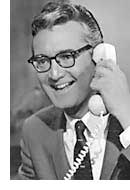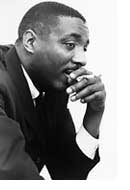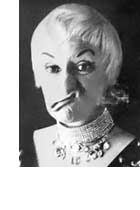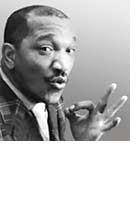Laughing Stock of the Mid-Century - Page 5
Newhart's characteristic dry, constrained delivery matched the image, and allowed fans to laugh at the everyman conventions he represented, even when built on such fantastic premises as a phone conference between an adman and Sir Walter Raleigh about the 'discovery' of tobacco. A pair of popular sitcoms in the '70s and '80s sustained both Newhart and the gently ticklish appeal that had sold his stand-up act. Newhart remains in demand for character parts in film comedies.
8. STEVE ALLEN
 More than many an entertainer and most TV hosts, Steve Allen always looked like he loved life and was able to laugh with it as much as at it. In turn, there were many cultural figures of the '50s who were more than happy to keep Allen company in his TV productions, the original 'Tonight Show' and the 'Steve Allen Show,' and many thousands of viewers who wanted to be there with them. Like Lenny Bruce, Allen was nurtured by comedy, in his case by an ex-vaudeville mother and an extended Irish-American family.
More than many an entertainer and most TV hosts, Steve Allen always looked like he loved life and was able to laugh with it as much as at it. In turn, there were many cultural figures of the '50s who were more than happy to keep Allen company in his TV productions, the original 'Tonight Show' and the 'Steve Allen Show,' and many thousands of viewers who wanted to be there with them. Like Lenny Bruce, Allen was nurtured by comedy, in his case by an ex-vaudeville mother and an extended Irish-American family.
Early on, Allen became adept both at jazz-wise piano playing and at innovative on-air radio patter, both of which he transferred, in 1954, to a tenderized but tantalizing approach to television in a hosted variety show format, a user-friendly alternative to Ed Sullivan. Though never a stand-up or a trained thespian, Allen seemed comfortable appearing with such performers, chatting it up with them on camera and even sharing shtick. After the '50s, Allen continued to find plenty of work on and off the small screen, until his death in 2000.
9. DICK GREGORY
 A civil rights activist in the 1960s and a health-food advocate today, Dick Gregory has proven himself as funny in confronting these issues in his comedy act as he is serious about demonstrating for them. His determination dates back to his early days as an award-winning student track star in St. Louis, where he advocated for proper recognition of black athletes.
A civil rights activist in the 1960s and a health-food advocate today, Dick Gregory has proven himself as funny in confronting these issues in his comedy act as he is serious about demonstrating for them. His determination dates back to his early days as an award-winning student track star in St. Louis, where he advocated for proper recognition of black athletes.
In circumstances parallel to those of Lenny Bruce, Gregory found that some bookers in the '60s were skeptical about his forthrightness, but his onstage demeanor was always far less racy and threatening than that of Bruce or even Redd Foxx, dependent instead on meaningful storytelling and ironic wit. His approachability gained him relatively early access to high-scale venues, at a level achieved by few black comics apart from Bill Cosby. After a long hiatus, Gregory recently returned to performing, sometimes in the company of former colleague Mort Sahl.

10. PHYLLIS DILLER
The stand-up scene in 1950s San Francisco seemed to have virtually overlooked women, without a trace of guilt, until local singer and copywriter Phyllis Diller opened at the Purple Onion in 1955. From the start, Diller fashioned her onstage outfit and hairdo and much of her comic material around lampooning gender stereotypes and polite archetypes of marital relations. (In 'Seriously Funny,' Jerry Nachman describes Diller as "the anti-Harriet Nelson.")
Delivering her self-criticisms and pokes at her husband 'Fang' in an abrasive but infectious screech, Diller was an acquired taste, but her indelible image became more familiar and entertaining over time. While never counted among doctrinaire feminists, Diller must be credited with shoving her gender into its rightful place in the comic spotlight, where she's remained a role model to female stand-ups.
11. REDD FOXX
 While still a teenager and already performing in the early 1940s, Redd Foxx moved out of poverty in his native St. Louis and on to Chicago and New York City, where he worked the so-called Chitlin Circuit, entertaining other blacks as a nightclub comedian and actor. In Los Angeles in the early '60s, Foxx began recording raunchy material, which helped establish him as a guilty pleasure among both blacks and whites. Onstage, his trademark swagger and carping delivery created a curious and compelling combination of cockiness and raw vulnerability.
While still a teenager and already performing in the early 1940s, Redd Foxx moved out of poverty in his native St. Louis and on to Chicago and New York City, where he worked the so-called Chitlin Circuit, entertaining other blacks as a nightclub comedian and actor. In Los Angeles in the early '60s, Foxx began recording raunchy material, which helped establish him as a guilty pleasure among both blacks and whites. Onstage, his trademark swagger and carping delivery created a curious and compelling combination of cockiness and raw vulnerability.




